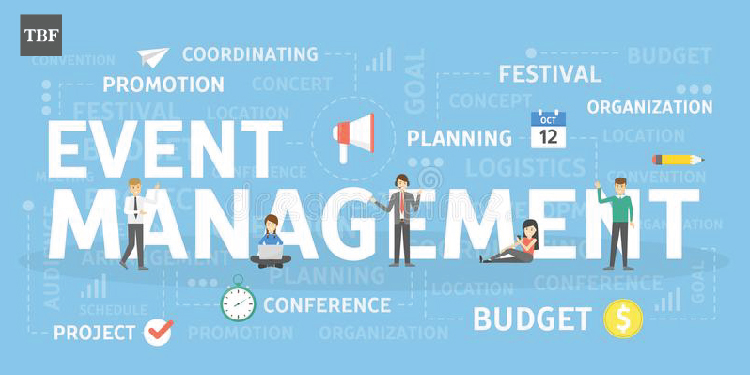A Deep Dive Into Exactly How Event Management Works to Create Unforgettable Experiences
Event management is a complex discipline that combines numerous elements to craft extraordinary experiences. It requires a clear understanding of the event's objective and audience. Coordinators must navigate budgeting, logistics, and advertising and marketing to guarantee a smooth execution. Each element plays an important role in accomplishing the desired influence. The trip does not finish with the event itself. There are understandings to uncover that can shape future endeavors.
The Fundamentals of Event Management
Reliable event management includes a variety of vital concepts that guide the planning and execution of effective occasions. At its core, it includes comprehending the event's objective, target market, and preferred outcomes. Determining the target demographic is essential, as it notifies choices connected to material, advertising and marketing, and logistics.
Budgeting is another basic aspect, ensuring that resources are designated effectively while satisfying the event's goals. This includes preparation for unanticipated costs that may develop.
Time management plays a crucial role, as event supervisors need to develop a comprehensive timeline to coordinate different tasks and turning points.
Additionally, reliable communication among stakeholders, suppliers, and staff member is essential to ensure placement and stay clear of misconceptions.
Risk management have to be considered, with backup strategies in place to deal with possible difficulties, therefore boosting the total experience for participants and assuring a smooth implementation of the event.
Key Functions in Event Preparation
In event preparation, recognizing vital duties is important for effective execution. The event planner is accountable for overseeing logistics and making sure all elements straighten with the vision. In addition, effective vendor management is crucial for maintaining high quality and fostering solid collaborations throughout the planning process.
Event Planner Duties
An occasion coordinator orchestrates the intricate aspects of event planning, making sure smooth execution from conception to final thought. They are in charge of conceiving the event theme, establishing budgets, and developing timelines to keep the task on the right track. Control with stakeholders, consisting of clients, location managers, and volunteers, is vital to align assumptions and assist in communication. The organizer likewise oversees logistics, such as event catering, transportation, and modern technology needs, ensuring all elements work sympathetically. They perform website visits, take care of timetables, and troubleshoot concerns that may develop throughout the event. Post-event, the organizer reviews the event's success, gathering feedback and evaluating end results to inform future jobs. This diverse function requires solid organizational skills, interest to information, and reliable social interaction.
Supplier Management Basics
Steering through the landscape of vendor management is vital for effective event planning. Efficient vendor management includes determining, choosing, and coordinating providers who give crucial solutions, such as event catering, audiovisual assistance, and decoration. Event organizers have to keep solid interaction with suppliers to guarantee that all aspects align with the event's vision. Key roles include the vendor supervisor, who manages agreements and settlements, and the logistics planner, in charge of on-site arrangement and execution. It's essential to develop clear expectations and timelines, fostering a collaborative setting that enhances the general experience. By prioritizing these components, event coordinators can navigate possible obstacles, making sure that every information contributes to a seamless and memorable event.
Crafting a Vision: Principle Growth

As soon as a vision is developed, it ends up being necessary to convert it into workable elements. This consists of specifying the atmosphere, selecting appropriate venues, and determining the event's style. Collaborating with stakeholders, consisting of sponsors and partners, even more fine-tunes the concept, making sure that all celebrations share an unified understanding of the event's purpose. Eventually, a well-developed vision not only enhances attendee interaction yet likewise sets the phase for memorable experiences that reverberate long after the event ends.
Budgeting and Source Allocation
With a clear vision in area, the following action in event management involves careful budgeting and source allocation. This essential stage guarantees that all required components are funded and straightened with the event's goals. Event supervisors begin by approximating costs associated with location selection, wedding catering, home entertainment, and advertising. They produce a detailed budget plan that lays out each category, enabling transparency and liability.
Source allocation prolongs past finances; it additionally incorporates human resources. Recognizing team functions, responsibilities, and timelines is vital to ensure performance. Event supervisors have to also take into consideration contingencies for unexpected costs or adjustments in extent, developing a barrier within the budget.
Moreover, focusing on investing on components that enhance guest experiences is vital. By tactically assigning sources, event managers make the most of effect while preserving monetary More about the author control. This disciplined approach not just cultivates effective events yet additionally builds trustworthiness and trust with stakeholders and participants.
Logistics: The Backbone of Event Implementation
While budgeting lays the foundation for an occasion, logistics offer as its foundation, assuring that every facet is implemented efficiently and effectively. charlotte event companies. This includes a variety of tasks, consisting of venue selection, transport setups, and equipment procurement. Reliable logistics management calls for precise preparation and sychronisation to guarantee that all components straighten with the event's timeline and goals
Secret elements of logistics consist of stock management, where supplies and products are tracked to stop lacks, and staffing, which entails recruiting and training employees to deal with numerous tasks. Communication is additionally essential, as it promotes partnership among suppliers, enrollers, and the event group.

Marketing and Promotion Approaches
Effective advertising and marketing and promo strategies are essential for taking full advantage of attendance and interaction at an occasion, as they generate rate of interest and enjoyment amongst possible individuals. Event supervisors employ a mix of typical and digital marketing methods to reach their target audience. Social network systems, e-mail projects, and targeted advertisements are frequently utilized to produce buzz and foster area interaction. Collaborations with influencers or market leaders can improve reliability, while engaging content such as videos and testimonies can reverberate with prospective attendees.
Furthermore, leveraging event-specific hashtags and developing shareable graphics encourages natural promotion among guests. Early riser ticket deals and special promotions can incentivize enrollment, in addition boosting interest. In addition, a see here now properly designed internet site that offers easy navigating and clear information concerning the event can boost the individual experience. By applying these advertising and promotion approaches, event managers can guarantee greater presence and inevitably produce an unforgettable experience for all participants.

Determining Success: Responses and Assessment
Success in event management depends upon robust comments and analysis devices. These procedures are essential for determining the performance of an event and identifying locations for improvement. By collecting input from attendees, coordinators can analyze fulfillment levels, understand preferences, and determine overall impact. Studies and meetings offer as important devices for accumulating quantitative and qualitative information, enabling extensive analysis.
Furthermore, examining essential performance indications (KPIs) such as participation prices, engagement degrees, and return on investment (ROI) supplies a clearer image of event success. Post-event debriefing sessions with the planning group likewise contribute insights, cultivating a culture of continuous improvement.
Inevitably, a methodical technique to responses and assessment not just boosts future occasions however additionally enhances connections with stakeholders. By carrying out these my latest blog post approaches, event managers can produce remarkable experiences that resonate with individuals and drive ongoing involvement.
Regularly Asked Inquiries
Exactly How Do Event Managers Handle Unforeseen Obstacles Throughout an Occasion?
Event supervisors deal with unexpected difficulties by remaining tranquility, evaluating the circumstance, and implementing backup plans - charlotte event companies. They connect efficiently with their team, adjust promptly, and prioritize remedies to guarantee the event proceeds smoothly and successfully
What Modern Technology Tools Are Necessary for Modern Event Management?
Essential innovation devices for modern event management consist of event enrollment software, project management applications, guest engagement platforms, and analytics tools. These sources enhance procedures, enhance interaction, and boost overall event experiences for organizers and individuals alike.
Just How Do Social Distinctions Effect Event Planning and Implementation?
Social distinctions considerably affect event planning and execution. They influence themes, personalizeds, communication styles, and expectations, requiring customized techniques to ensure inclusivity and respect, eventually forming the total experience and success of the event.
What Are the Ethical Considerations in Event Management?
Ethical factors to consider in event management encompass openness, sustainability, cultural sensitivity, and inclusivity. Organizers should prioritize fairness, respect varied target markets, decrease ecological effect, and warranty accessibility to produce responsible and remarkable experiences for all participants.
How Can Sustainability Be Integrated Into Event Preparation?
Sustainability can be incorporated into event planning by utilizing environment-friendly products, minimizing waste, sourcing regional suppliers, carrying out carbon countered programs, and promoting electronic remedies to decrease paper use, consequently enhancing ecological consciousness within the event's structure.